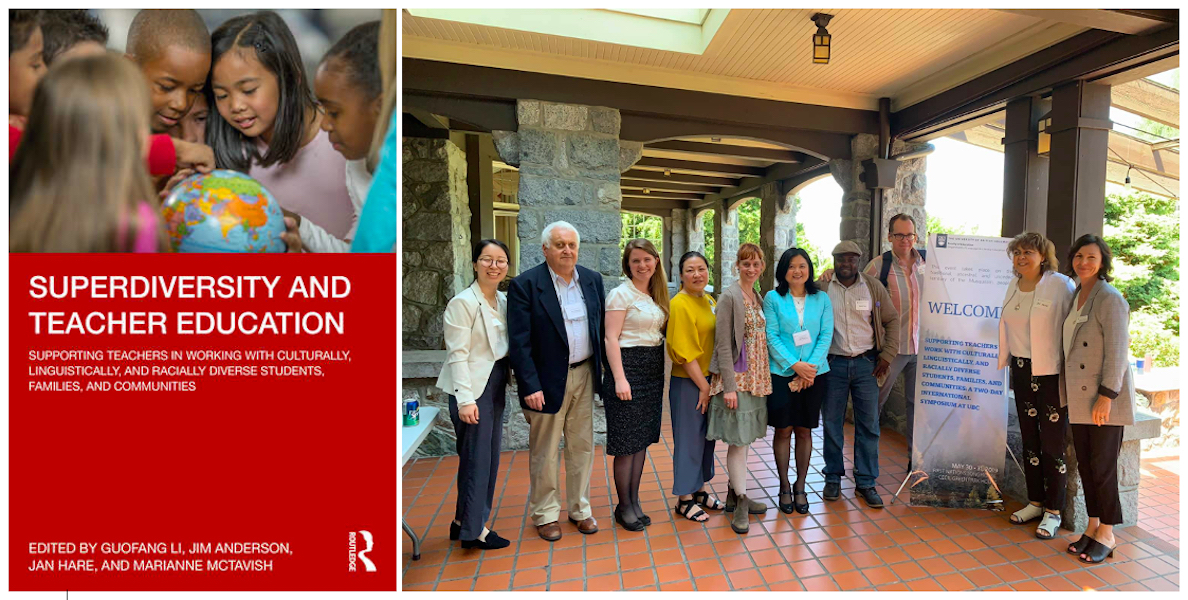The new book, ‘Superdiversity and Teacher Education: Supporting Teachers in Working with Culturally, Linguistically, and Racially Diverse Students, Families and Communities,’ challenges existing teaching and learning paradigms, shifting away from the current Eurocentric, monolingual and assimilative approach towards centering and normalizing “superdiversity” in students.

By addressing the need to understand and support the fast-growing population of students who are considered superdiverse in their cultural, linguistic and racial backgrounds, the book provides educators with ways of moving beyond the demographic backgrounds of superdiverse learners and to consider not only their ways of being, motivations and social processes, but also the ongoing systemic issues of marginalization and inequity that confront these learners.
One of the book’s co-editors and authors, Dr. Guofang Li, Professor and Tier 1 Canada Research Chair in Transnational/Global Perspectives of Language and Literacy Education of Children and Youth at UBC, shared that her research identified how important it was to support the varying needs of superdiverse children and how current approaches to education do not fulfill or address these needs.
“People need to expect that superdiversity is now the norm and that students come into school with diverse experiences, challenges and needs,” said Li. “Teachers need to be prepared for how to use different pedagogical strategies to address those needs to achieve equity and ensure success.”
Much of the content of the book was developed from conversations held at a symposium in 2019 which convened scholars from both Canada and the U.S. specializing in teacher education for superdiverse learners. Almost 200 researchers, graduate students, teacher candidates, in-service teachers and administrators from local school districts and community members engaged in the two-day event.
Monica Shank Lauwo, PhD candidate in Language and Literacy Education at UBC and co-author of the book’s concluding chapter, shared that the book grew from dialogic experiences at the symposium

which naturally led to a rich collaborative process. The impactful conversations held at the symposium also directly launched Shank Lauwo into the work that has now become her PhD research.
“Because the book grew out of a symposium, it grew out of conversation. It’s not just a collection of individual scholar-educator’s research contributions,” said Shank Lauwo. “It’s really a conversation about bringing diverse perspectives and practices together in dialogue.”
When exploring the concept of superdiversity, Li explained that it is relevant now more than ever due to how quickly the world is changing with factors such as the increase of refugee children coming into Canadian education systems, learning more about how intergenerational trauma impacts Indigenous students, and how the COVID-19 pandemic changed the context of education.
“It’s so relevant right now,” said Li. “For example, we have a renewed understanding of the kind of trauma that our Indigenous children have gone through, and other minoritized children who come into the school system with different kinds of historical trauma and superdiverse needs. This book showcases how we can prepare teachers to help children with superdiverse backgrounds when they come to the classroom.”
The book challenges existing hegemonic teaching and learning paradigms and provides new methods and examples for supporting superdiverse learners in a range of settings.
Shank Lauwo shared that it’s important to recognize the role that educators play in affirming student identities and explained that all educators are responsible for antiracism and embracing linguistic diversity, highlighting the importance of internalizing a new approach that normalizes superdiversity.
“A theme that comes up regularly throughout the book is about these paradigm shifts that need to happen: ideological shifts towards more asset-oriented perspectives, and shifts in ways of being and knowing that are valued in systems of schooling,” said Shank Lauwo. “At the end of the day we’re talking about systemic changes that need to happen; that colonialism and racism are embedded in the systems and institutions of schooling, and supporting [superdiverse] learners moves us towards reimagining how education systems can be built in ways that are decolonial, antiracist and more supportive of equity for everyone.”
To learn more about the book and order a copy, click here.
Written by Kelsea Franzke
